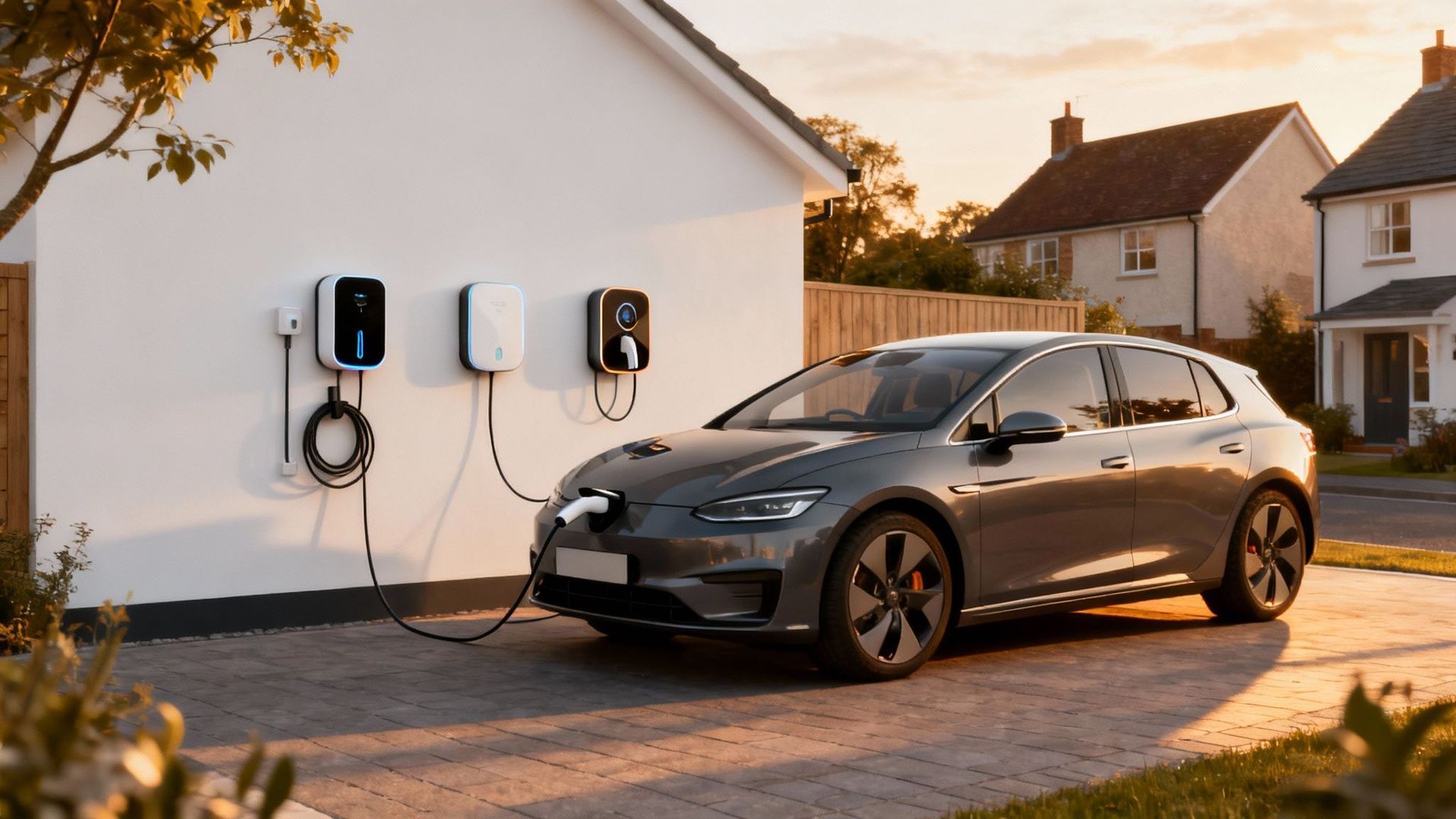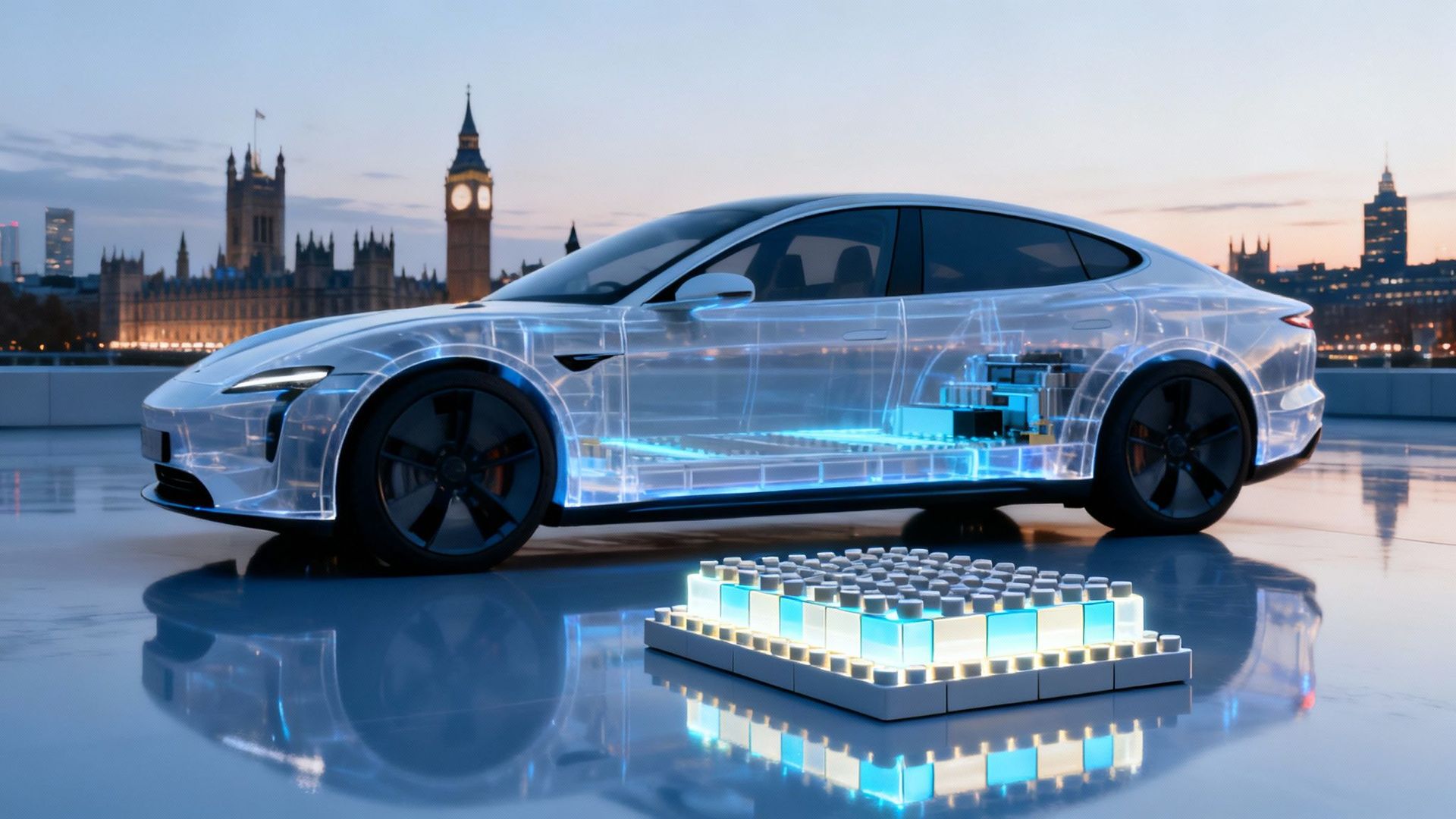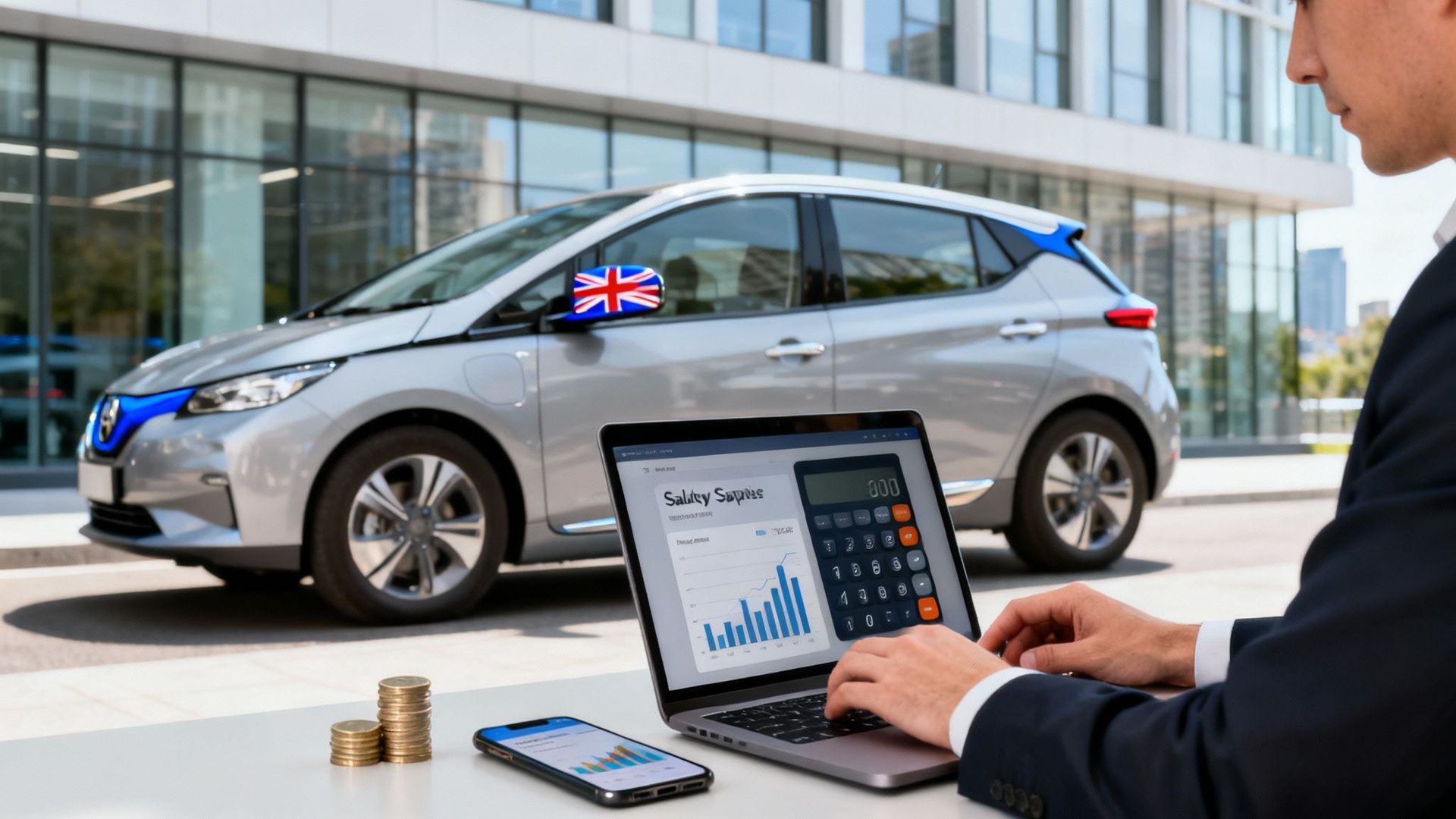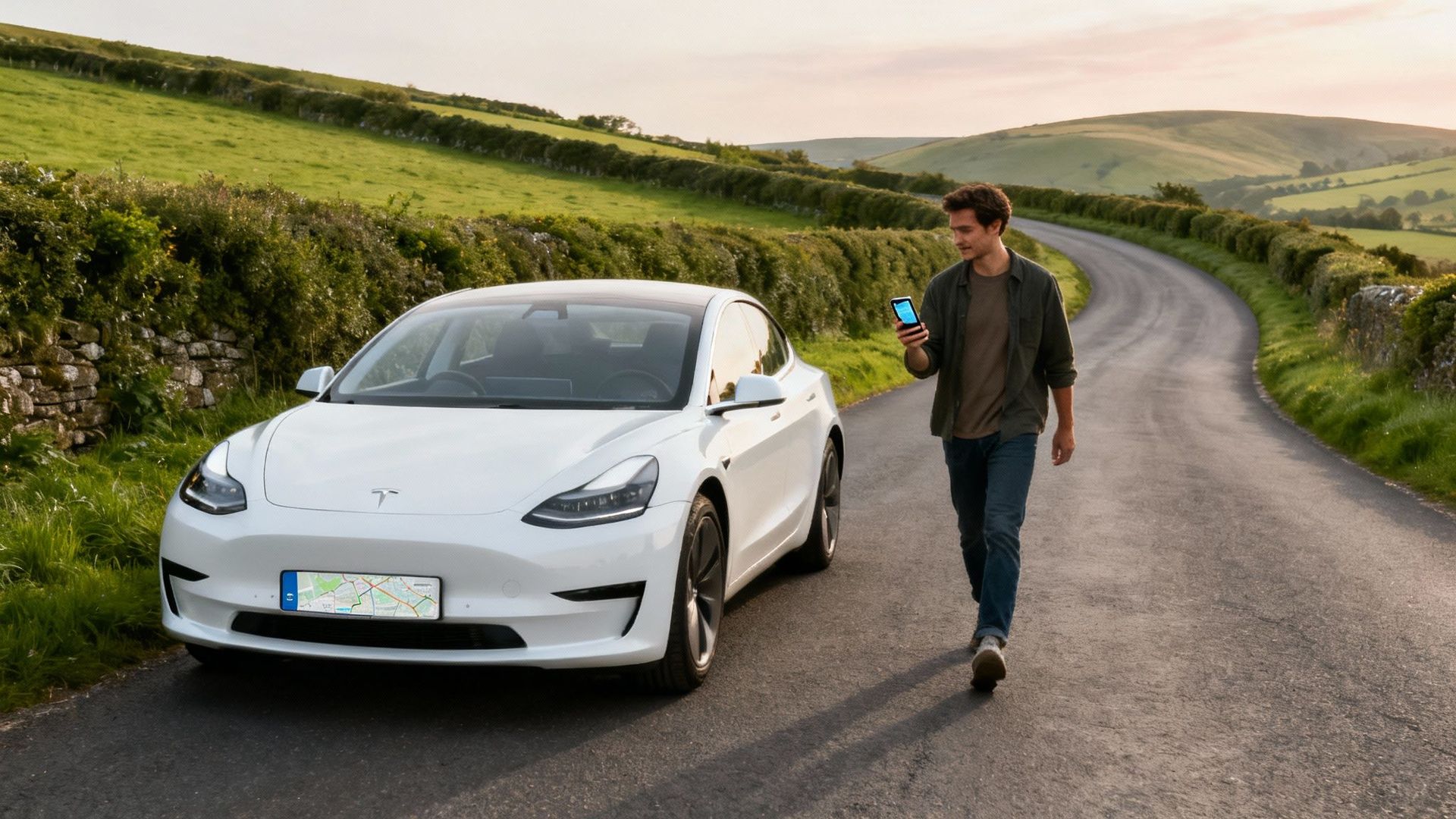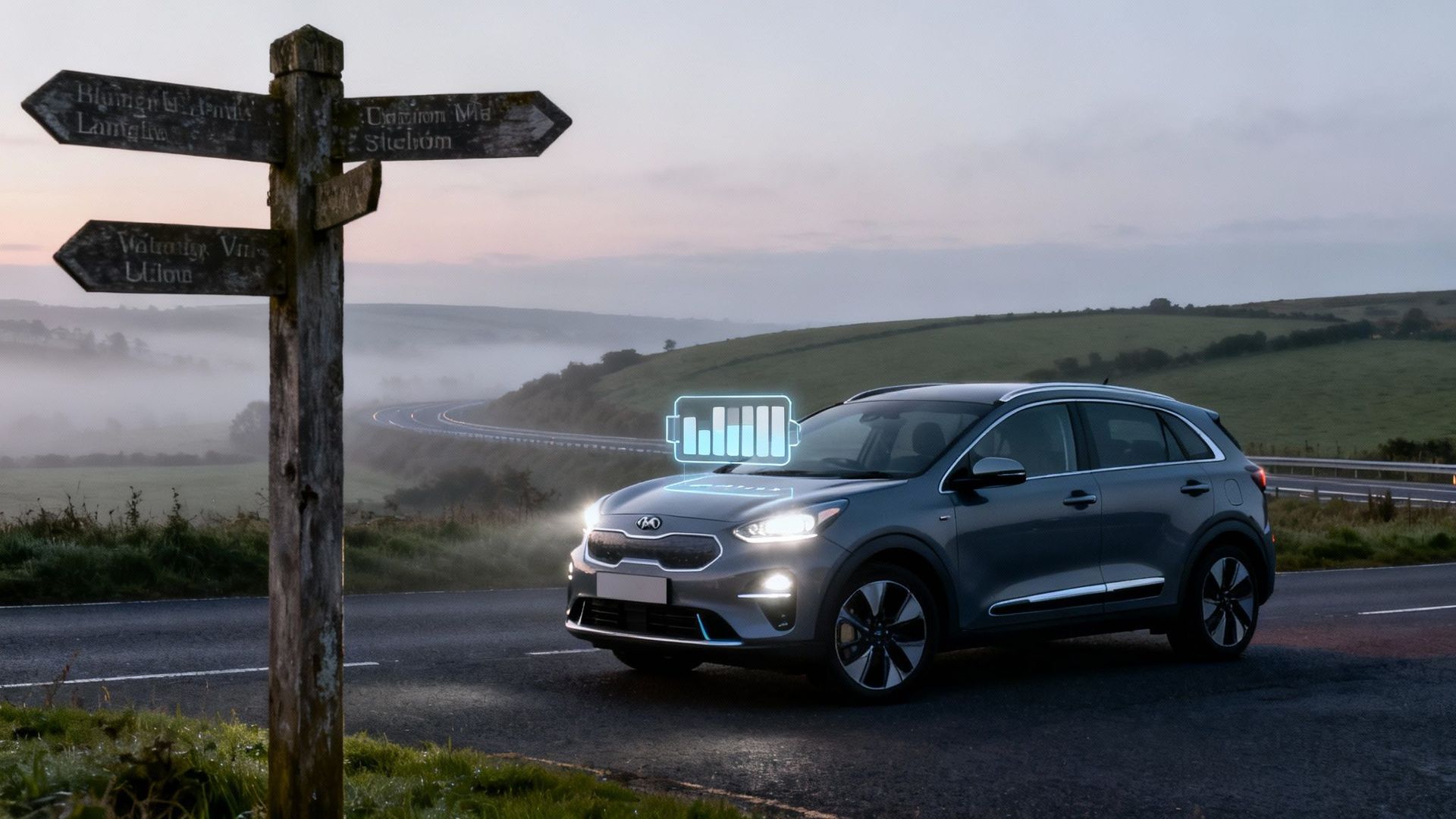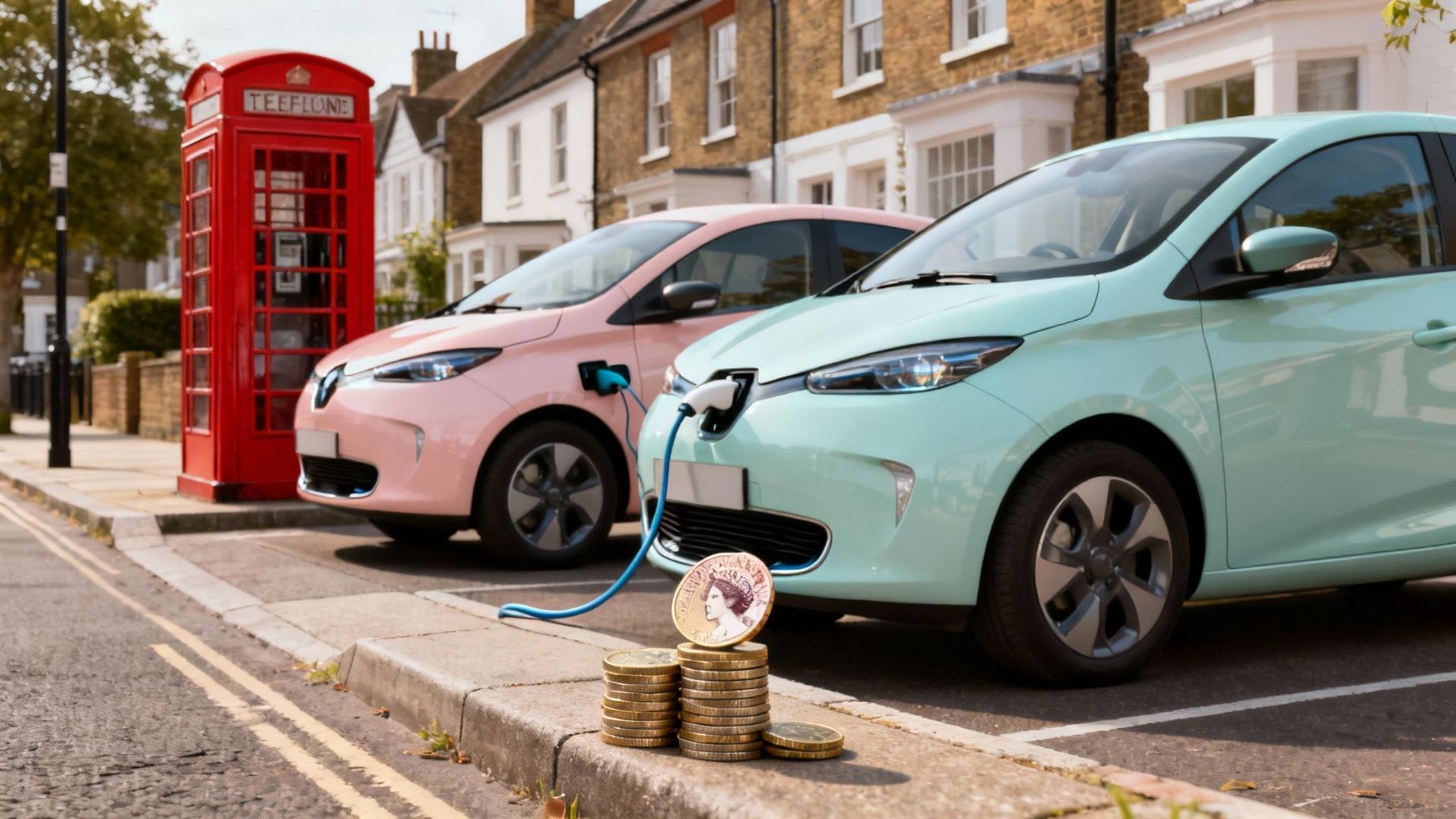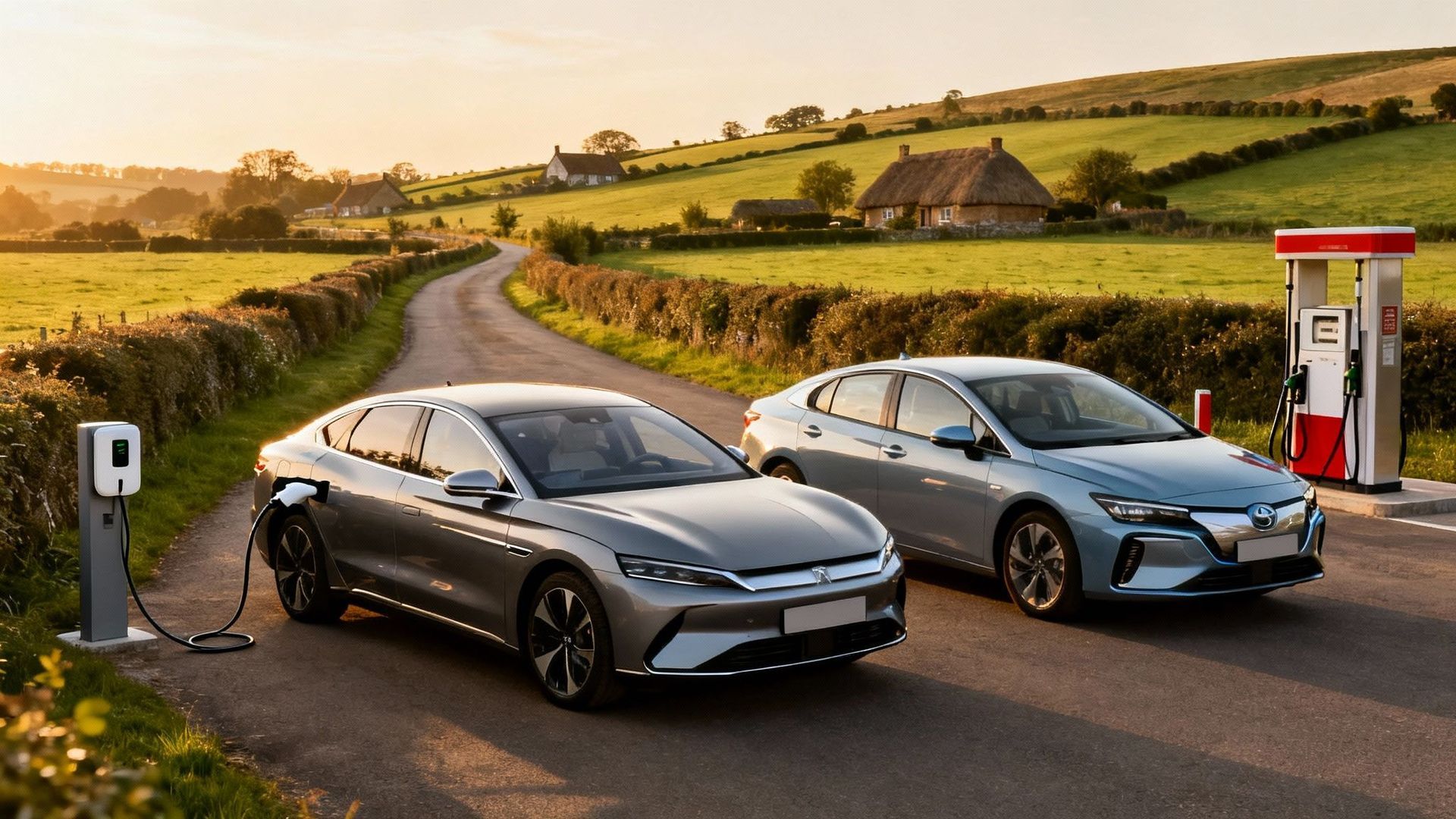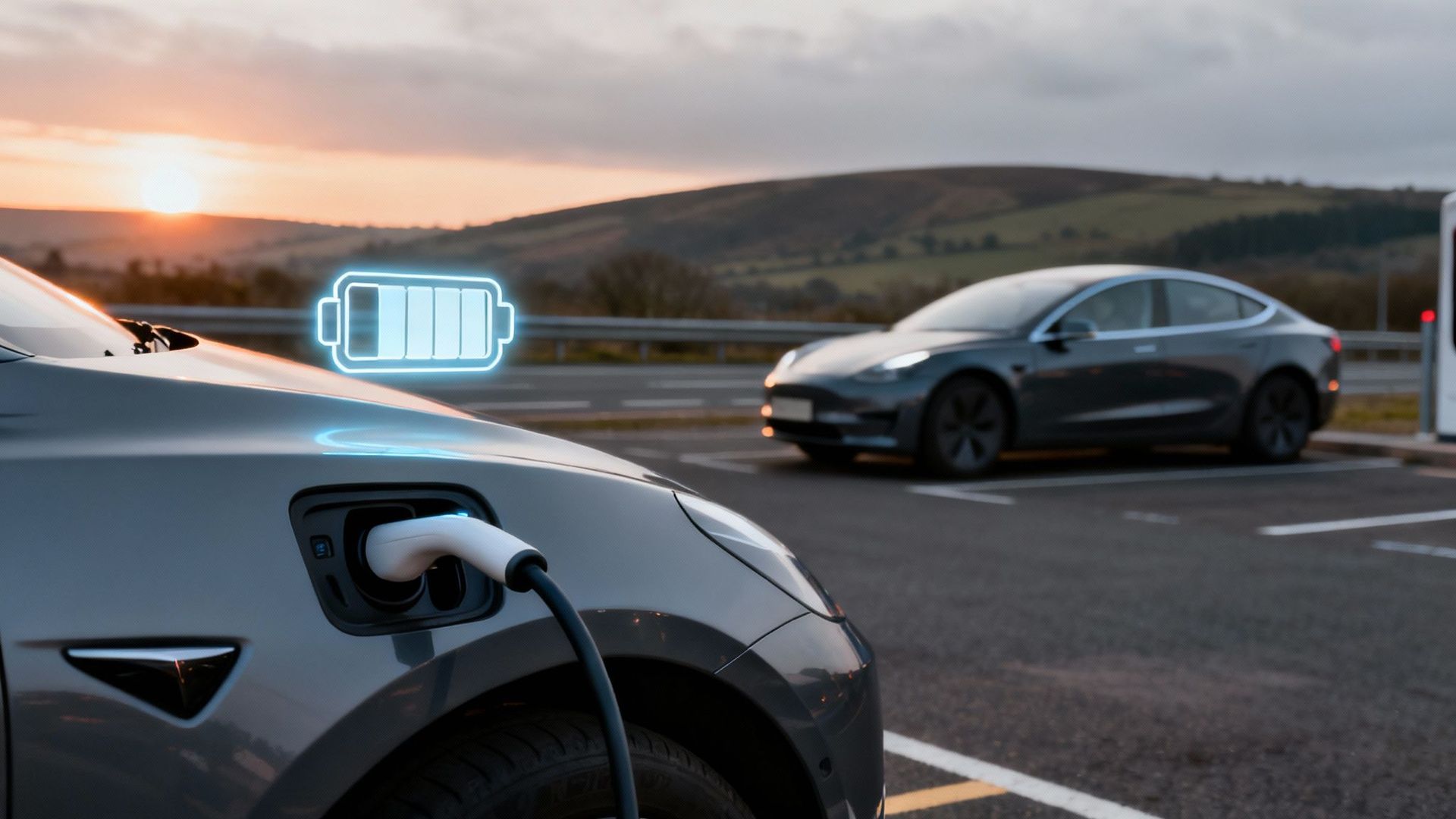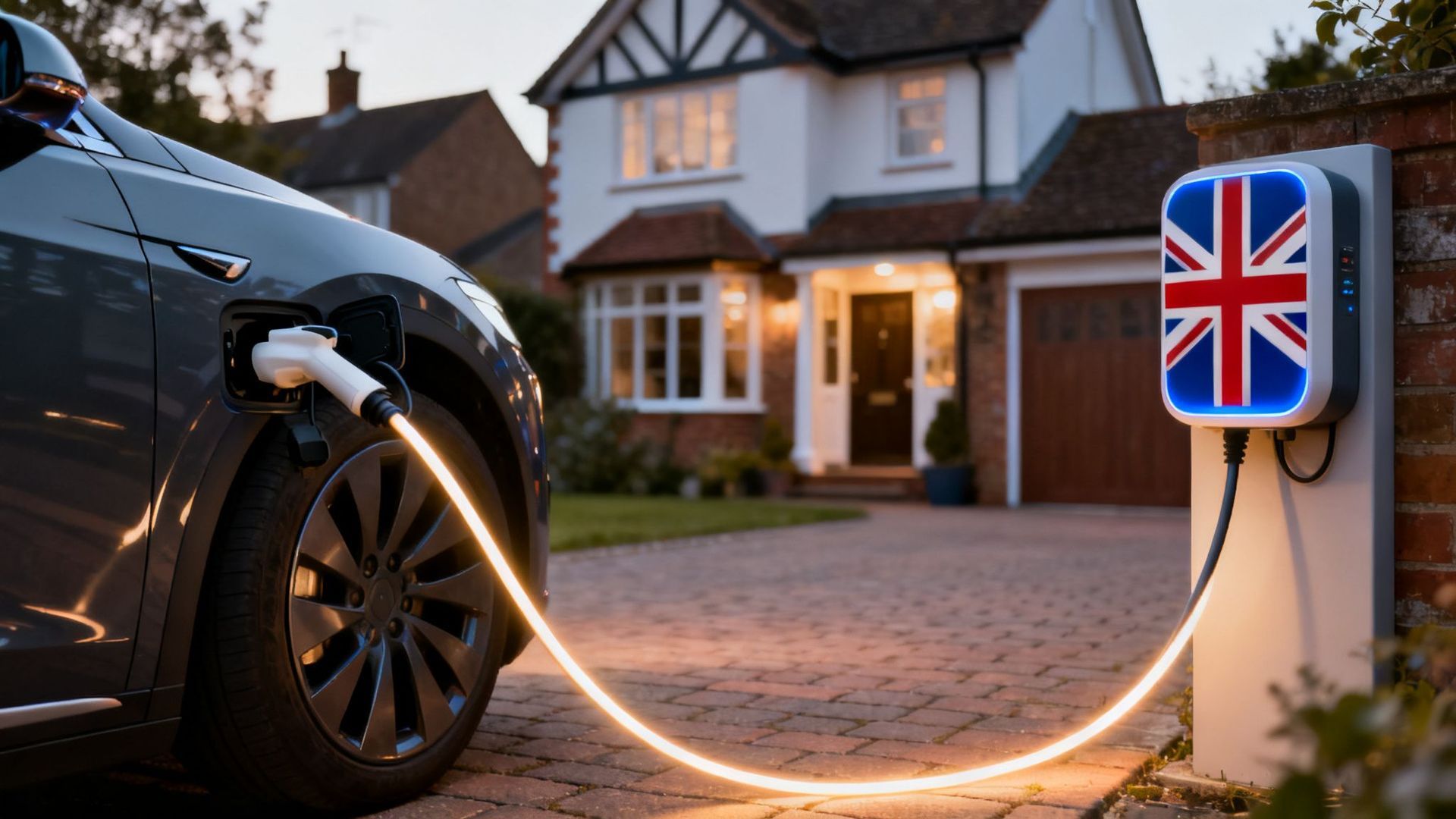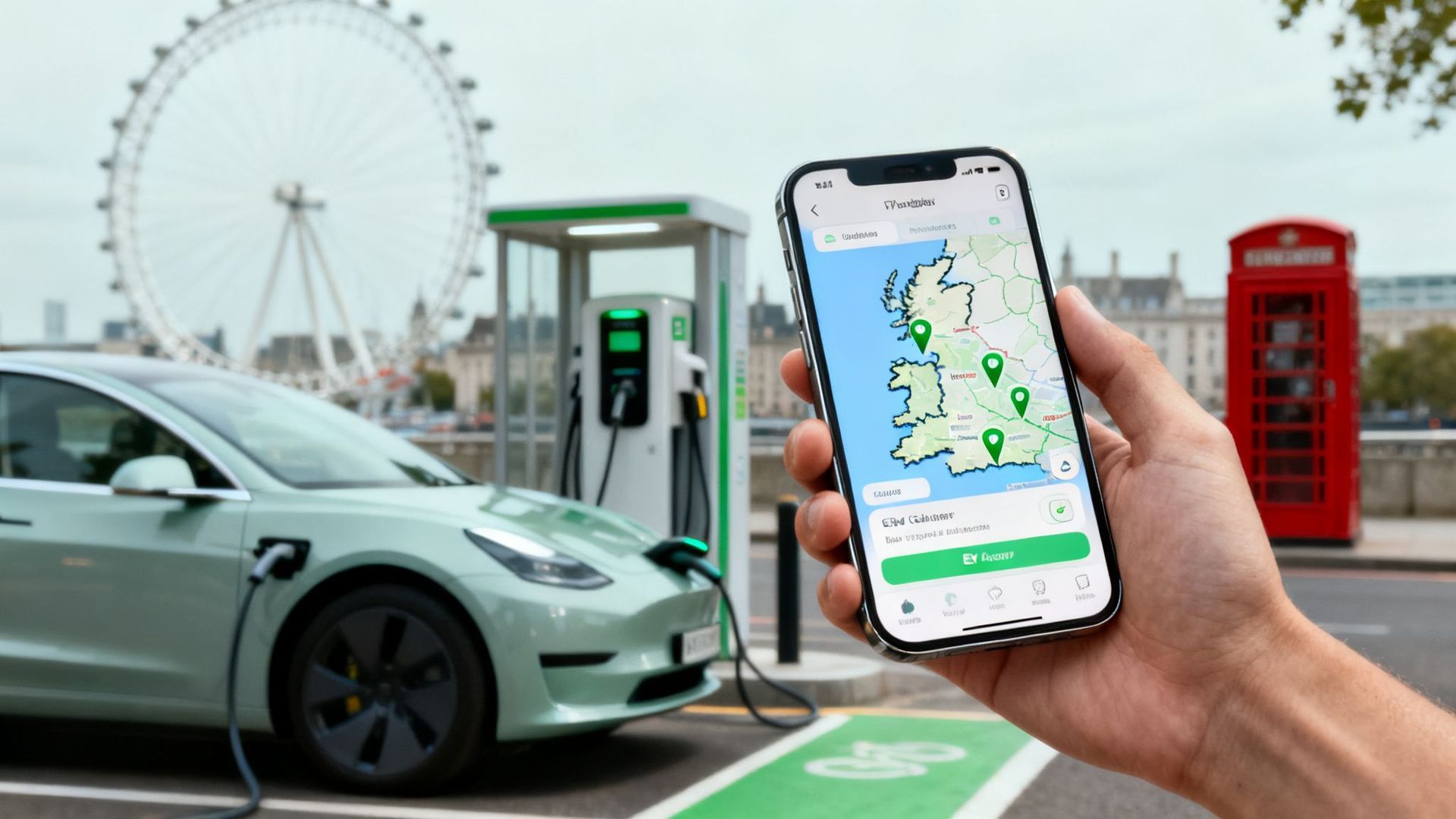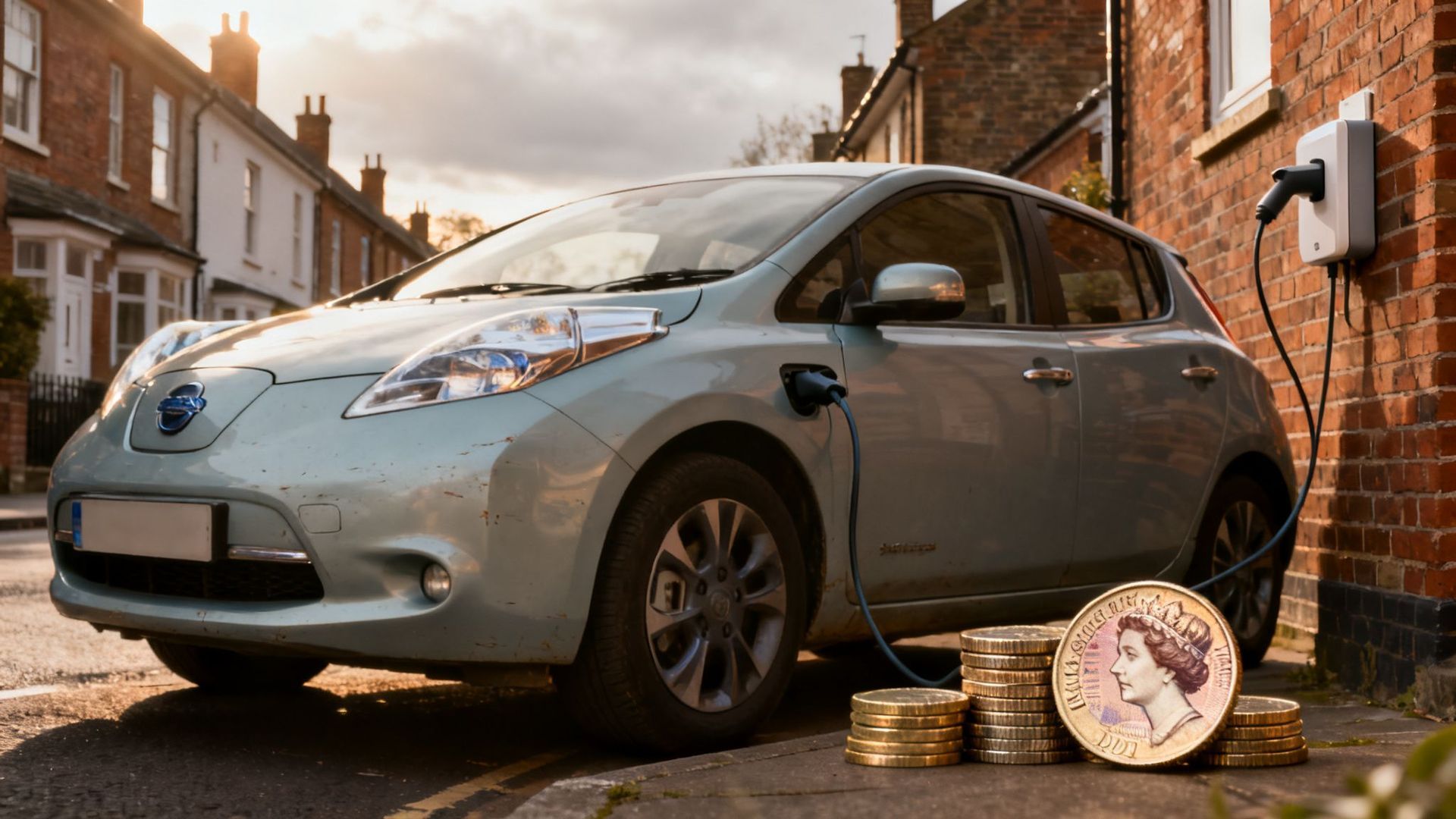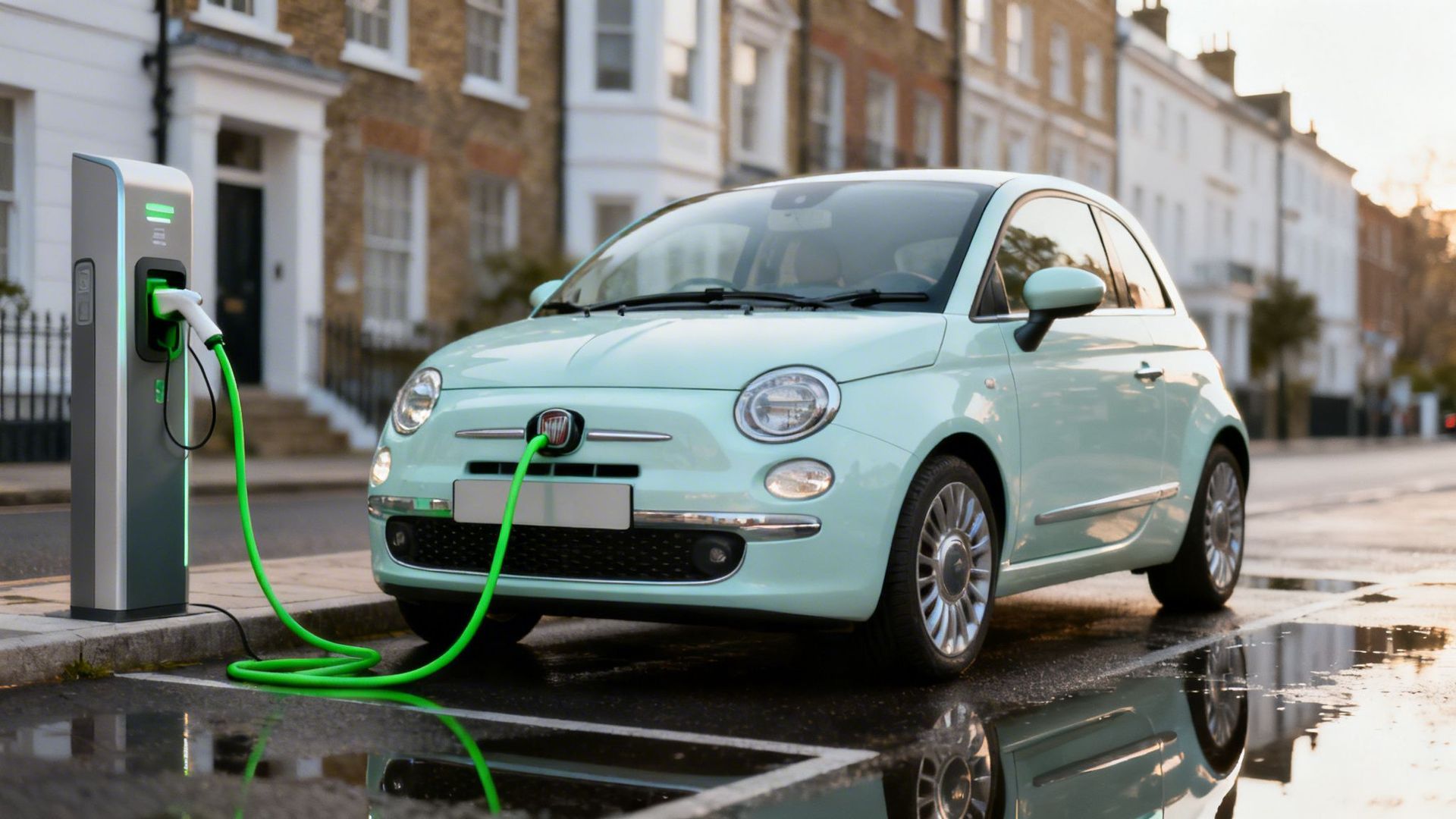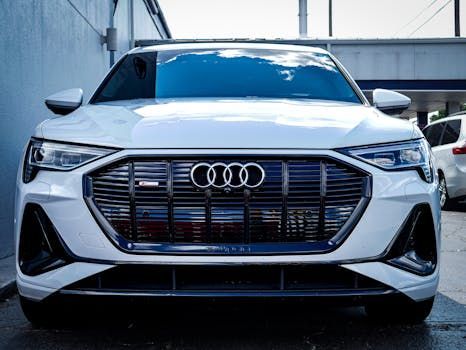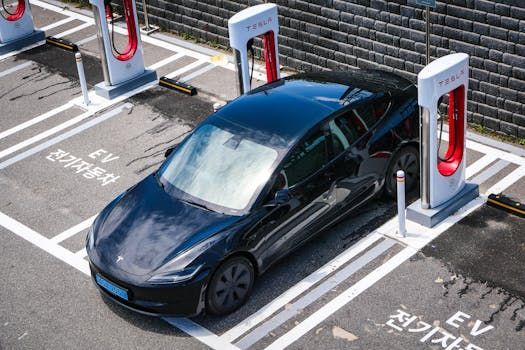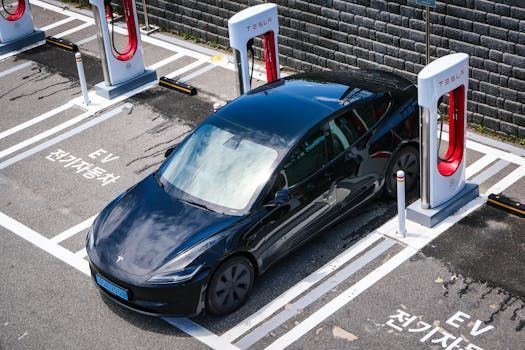The Truth About Electric Car Depreciation
Ah, electric car depreciation. The dinner party topic guaranteed to send a shiver down the spine of any aspiring EV owner. You’ve heard the horror stories, haven't you? Tales of electric cars losing value faster than a politician's promise, supposedly becoming as worthless as a chocolate teapot the second you drive off the forecourt.
It’s often painted as the big, scary monster lurking under the bed of EV ownership. But is it really the financial bogeyman it's made out to be? Let's have a proper look.
Debunking the Great EV Depreciation Myth
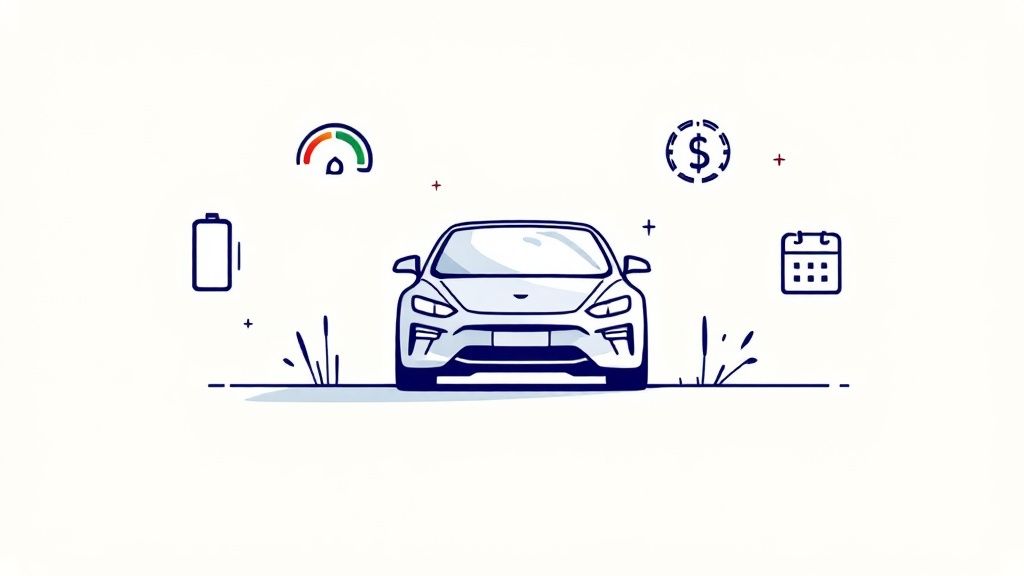
Let's clear the air. All that chatter you hear down the pub about EVs having the financial stability of a sandcastle in a tsunami is largely a hangover from the early days of electric motoring.
Cast your mind back to the first-generation Nissan Leafs. Their battery life was… limited, to put it politely. Those early pioneers did indeed depreciate at a rate that would make your eyes water, cementing a myth that has proven stubbornly difficult to shift.
But today’s market is a completely different beast. The technology has leaped forward, battery longevity is massively improved, and public perception is, slowly but surely, catching up. While some EVs in the UK might depreciate slightly faster than their petrol counterparts initially, this is often because their higher purchase price means a larger absolute drop in value. For a deeper dive, you can explore detailed findings on UK electric car depreciation rates.
The narrative is changing. As the UK hurtles towards the 2035 ban on new petrol and diesel cars, the long-term value proposition for EVs is becoming stronger, not weaker. The fear is outdated; the reality is far more nuanced.
This isn’t to say depreciation has vanished. It's an unavoidable, soul-crushing reality for any new car, electric or not. The key is understanding the real factors at play today. The game has changed, and the old rules simply don't apply anymore.
We're here to give you a no-nonsense guide to what electric car depreciation actually looks like in 2024 and beyond. No fluff, no PR spin, just the facts.
What Actually Drives an EV's Value Down?
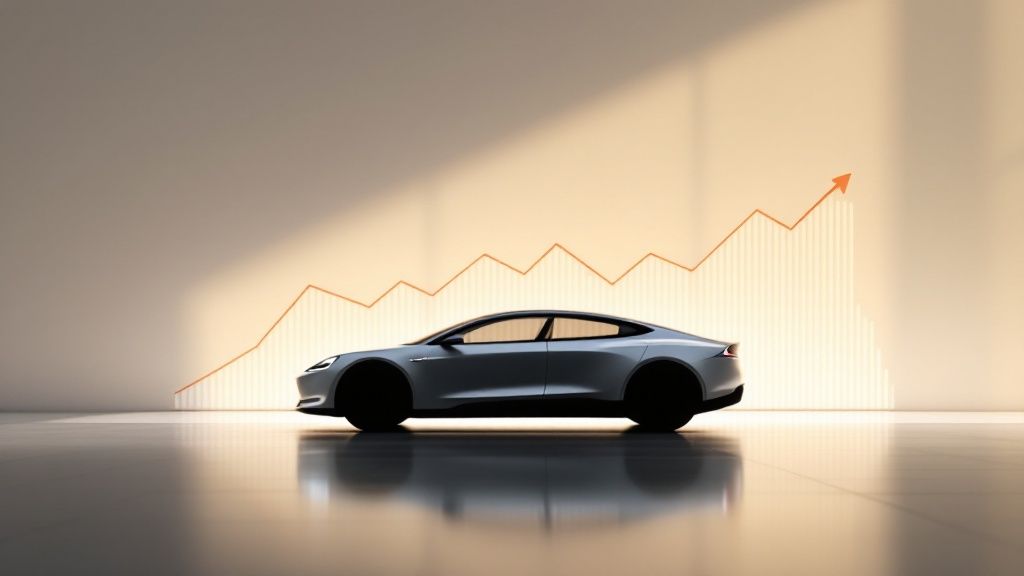
Depreciation isn't some dark art cooked up behind dealership doors. It's a cold, hard calculation, and for electric cars, the variables look quite different from their fossil-fuelled cousins. So, let’s pop the bonnet and see what’s really chipping away at your EV's worth.
For a moment, let's forget about mileage. The single most important factor for an EV's value is its battery health .
Think of it like your smartphone. A two-year-old phone with a battery that still lasts all day is far more appealing than one that’s gasping for a charger by lunchtime. It’s the exact same logic with an EV, just on a much bigger, more expensive scale.
This health check is officially known as the State of Health (SoH) . A brand-new EV rolls out with 100% SoH , but over time and with every charge, this capacity naturally declines. On average, modern batteries degrade by just 1.8% per year, but the way a car is charged and stored can make a huge difference. For any used buyer, that SoH figure is gold.
The Big Three Value Killers
Beyond the battery, three other major forces are constantly pushing down on an EV's resale price. Each one can have a dramatic impact on what your car is worth when it's time to sell.
-
Government Grants and Incentives: A bit ironic, this. The very grants designed to help people buy an EV can seriously kneecap its resale value. When the government suddenly knocks a few thousand quid off a new model, it instantly makes every used equivalent on the market look overpriced. A car that was £35,000 yesterday seems far less attractive when a brand-new one is now only £32,000. Cheers, Rishi.
-
The Relentless March of Technology: The EV world moves at lightning speed. A new model boasting a genuine 400-mile range makes last year’s 250-mile hero seem a bit quaint. This rapid innovation means older EVs can feel obsolete much faster than petrol cars, where the core technology has been gently refined for decades.
-
Brand Reputation and Model Popularity: Just like in the old days of internal combustion engines, the badge on the front still matters a great deal. Premium brands with a reputation for quality and innovation tend to hold their value better. In the same way, a popular, well-loved model will always have more potential buyers than an obscure one that sold in tiny numbers.
It's a bitter pill to swallow, but a car's colour can genuinely affect its value. A sleek black, white, or grey EV will always be an easier sell than one in a questionable shade of beige or lime green. Some things never change.
Ultimately, getting your head around these factors is key. The health of the battery is paramount, and you can learn more about the truth about battery health reports on used EVs to arm yourself with the right knowledge. But never underestimate how quickly government policy and new tech can shift the goalposts for your car’s value.
Which EVs Hold Their Value Best?
When it comes to the harsh reality of resale value, not all electric cars are created equal. Let's get down to brass tacks and name some names, because knowing which models are depreciation champions—and which are financial black holes—is vital before you sign on the dotted line.
The simple truth is, some EVs cling onto their value with surprising grit, while others shed pounds sterling faster than a dog sheds its winter coat. The difference often comes down to a powerful mix of brand reputation, desirable tech, and sheer popularity. A premium badge and a name for solid engineering can make all the difference.
This chart gives a clear picture of how electric car depreciation stacks up against their petrol counterparts over a typical ownership period.
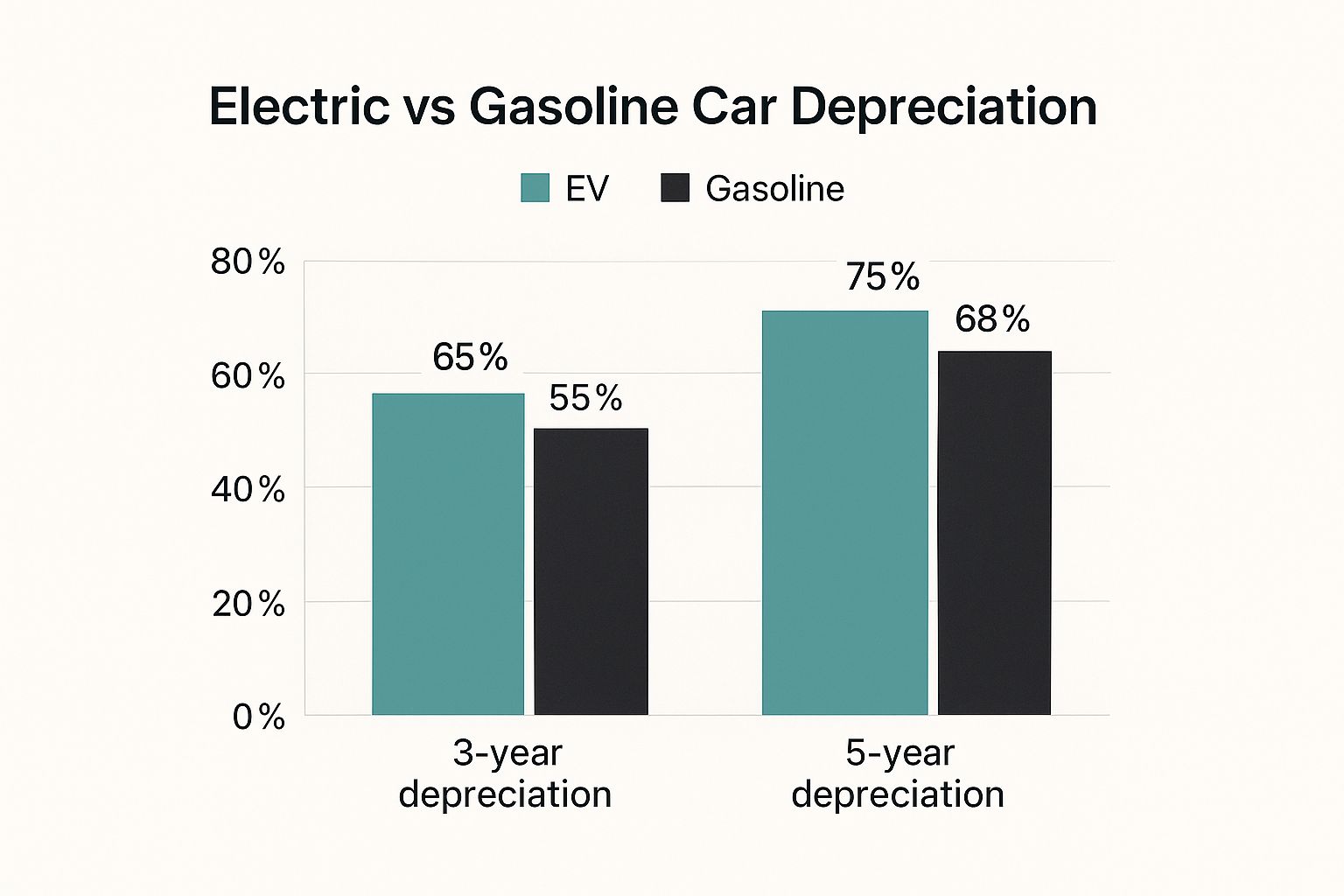
As you can see, while EVs do take a steeper hit in the first few years, the gap starts to close as petrol cars continue their steady slide downwards over five years.
The Winners and Losers Circle
So, which specific models are leading the pack in value retention? It's a real mixed bag. For instance, the Porsche Taycan is a depreciation superstar, holding onto a staggering 77.47% of its value after three years. On the other hand, even a massively popular car like the Tesla Model 3 Long Range keeps a more modest 57.91% over the same period. It just goes to show how much brand prestige matters. For a deeper dive, you can explore more data on how different EV models retain their value and see the full picture.
Why such a massive difference? A few key things are at play:
- Premium Badge Power: Brands like Porsche and Mercedes-Benz just command higher resale values. Their long-standing reputation for luxury and performance speaks for itself.
- Technological Edge: Models that were ahead of the curve with their range and features when new tend to hold up better against the latest competition.
- Supply and Demand: Cars that had long waiting lists when they were new often have a ready-made audience in the used market, which helps keep their prices firm.
The big lesson here is that buying an EV isn't just about the initial price tag. The car's reputation and desirability are powerful clues to its future worth. Sometimes, a car that seems more expensive upfront can be the smarter financial choice in the long run.
To help illustrate this, here’s a look at some of the best and worst performers in the UK market when it comes to holding their value over three years.
UK Electric Car Depreciation Winners and Losers (3-Year Value Retention)
| Electric Car Model | Approximate Value Retained After 3 Years | Key Reason for Performance |
|---|---|---|
| Porsche Taycan | ~77% | Premium brand appeal, high performance, and strong initial demand. |
| MINI Electric | ~68% | Iconic design, fun driving experience, and popularity in urban areas. |
| Tesla Model Y | ~65% | High demand for electric SUVs, brand loyalty, and over-the-air updates. |
| Renault Zoe | ~45% | Early market entry means it faces stiff competition from newer, more advanced models. |
| Nissan Leaf | ~42% | An older platform and smaller battery by modern standards have impacted its resale value. |
| Jaguar I-PACE | ~40% | High initial cost combined with strong competition from newer luxury EV rivals. |
As you can see, it's a real mix. Cars with a strong brand identity or that fill a popular niche (like the MINI) do well, while some of the older pioneers are now struggling to keep up.
Understanding these market dynamics is key. A car that’s a hit today is far more likely to be a sought-after used buy tomorrow, protecting your investment from the worst of the depreciation sting.
The Financial Showdown: EV vs Petrol Depreciation
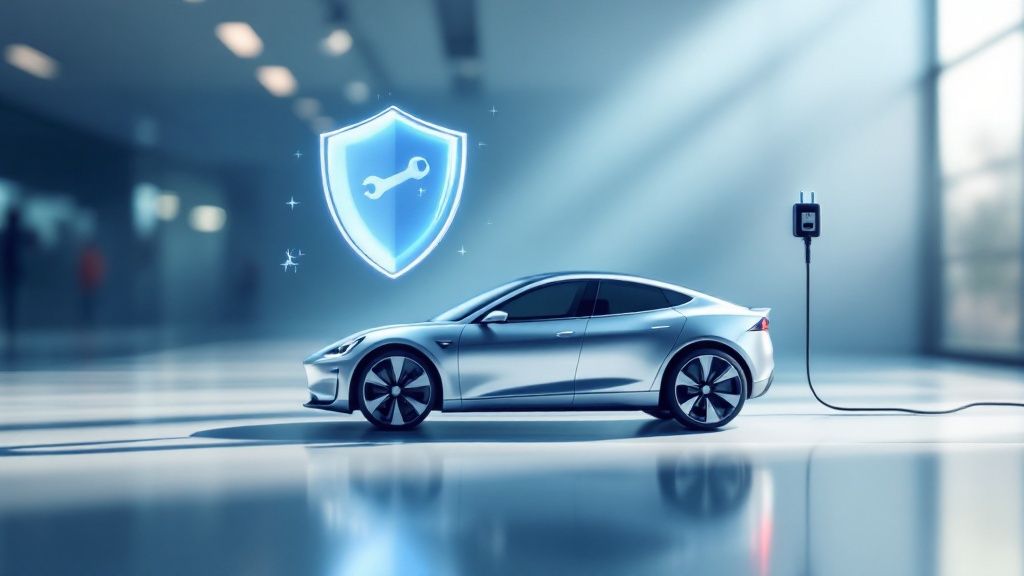
Right, let's get down to it. This is the main event: a proper head-to-head between electric and petrol cars in the depreciation arena.
It’s easy to get fixated on the initial purchase price, treating it like the final score, but that’s just the opening gambit. Judging a car solely on its sticker price is like judging a book by its cover; the real story unfolds over the years of ownership.
That’s when running costs, servicing bills, and taxes start to change the narrative completely. The headline depreciation figure for an EV might make you wince, but it’s only one part of a much bigger financial equation.
A petrol car might be cheaper to buy, but its thirst for fuel, its complex engine needing regular (and pricey) maintenance, and its annual road tax bill all chip away at your savings. An EV, by contrast, sips electricity for pennies, has far fewer moving parts to go wrong, and enjoys a friendlier relationship with the taxman.
Beyond the Initial Hit: The Total Cost Smackdown
To truly understand which car wins financially, you have to look at the total cost of ownership . This is the full picture, combining the initial loss in value with every single penny you spend to keep it on the road.
Recent analysis paints a fascinating picture here in the UK. While a typical £35,000 EV might lose between £19,250 and £21,000 over five years, the savings in other areas soon stack up. That's a steeper drop in cash terms than a £25,000 petrol car losing £15,000 to £16,250 , but hold your horses.
Over those same five years, fuelling that petrol car could cost you nearly £9,900 . Charging the EV? A much more palatable £4,800 .
When you factor in the significantly lower maintenance bills and zero road tax for the EV, the numbers really start to swing. Suddenly, that bigger depreciation hit doesn't seem quite so scary when you're saving thousands every year just to keep the thing moving.
To see how this plays out, we've put together a table modelling the typical costs. It shows that while the EV loses more value on paper, your bank account might actually be better off in the long run.
For an even deeper dive, check out our guide on the real cost of owning an EV compared to petrol cars.
5-Year Total Cost of Ownership EV vs Petrol Car
The table below breaks down the estimated costs for a typical £35,000 EV versus a £25,000 petrol car over a five-year period in the UK.
| Cost Factor | Electric Vehicle (EV) | Petrol Car (ICE) |
|---|---|---|
| Initial Purchase Price | £35,000 | £25,000 |
| 5-Year Depreciation | -£20,000 | -£15,500 |
| 5-Year 'Fuel' Cost | -£4,800 | -£9,890 |
| 5-Year Maintenance | -£1,250 | -£3,500 |
| 5-Year Road Tax | £0 | -£850 |
| 5-Year Insurance (Est.) | -£3,250 | -£2,750 |
| Total 5-Year Cost | £29,300 | £32,490 |
The results speak for themselves, don't they?
Despite losing more in pure depreciation, the EV’s dramatically lower running costs mean it could be over £3,000 lighter on your wallet over five years. It’s solid proof that electric car depreciation, while a chunky number, is only one chapter in a much longer financial story.
How to Protect Your EV's Resale Value
Right, so we've established that electric car depreciation is a thing. It’s an unavoidable law of motoring, a bit like finding a rogue crisp under the seat months after you finished the packet. But you don’t have to just lie down and take it.
You can't stop depreciation in its tracks, but you can definitely put up a good fight. Think of it as damage limitation. With a bit of savvy ownership, you can slow that financial slide and make sure your EV is as appealing as possible when it’s time to sell up.
Consider this your battle plan—a practical, no-nonsense guide to maximising your EV’s future worth and keeping more of your hard-earned cash where it belongs.
Master the Art of Battery Care
Your EV’s battery is its heart, its soul, and, crucially, its single biggest asset. Looking after it is the most important thing you can do to protect your car's resale value. You've got to treat it with the respect it deserves.
This all comes down to mastering your charging habits. Constantly hammering the battery with a DC rapid charger to 100% every day is like feeding a toddler a diet of espresso and fizzy pop—it’s going to end badly.
- The 20-80% Rule: For daily driving, try to keep your battery’s charge between 20% and 80% . This is the sweet spot that reduces stress on the cells and slows down long-term degradation.
- Limit Rapid Charging: Save the DC fast chargers for when you genuinely need them, like on a long road trip. For your day-to-day top-ups, a slower AC wallbox is much kinder to the battery’s health.
- Avoid Extreme Temperatures: If you can help it, don’t leave your EV parked in the blazing sun for days on end. Extreme heat is the arch-nemesis of battery longevity.
When you decide to sell, a Battery Health Certificate is your golden ticket. This official report proves the battery's State of Health (SoH), giving a potential buyer huge peace of mind and justifying a higher asking price. It’s the ultimate proof that you’ve been a responsible owner.
Sweat the Small Stuff
Beyond the battery, a few other key areas can make a massive difference in what a buyer is willing to pay. These are the details that separate a well-cared-for car from one that just looks a bit knackered.
First, keep a meticulous service history. A fully stamped digital service book shows you haven’t cut corners and have looked after the car properly. It builds trust and screams "reliable purchase." On that note, understanding the future of EV warranties and what it means for buyers can also give both you and the next owner some valuable reassurance.
Don't forget the optional extras. When you're buying new, tick the boxes for features that future buyers will actually want. A heat pump, for example, is a huge selling point because it dramatically improves winter efficiency. That panoramic roof and upgraded sound system also add far more resale appeal than a set of questionable racing stripes.
Finally, keep it looking sharp. It sounds obvious, but a car that’s clean, polished, and free from kerbed alloys and car park dings will always command a better price. First impressions really do count, and a tidy car suggests a careful owner.
Your EV Depreciation Questions Answered
Right, we've covered a lot of ground. But let's be honest, there are probably still a few nagging questions rattling around in your head. Let's tackle them head-on with some straight-talking answers to finally put those EV depreciation worries to bed.
Will the 2035 Petrol Car Ban Make My EV Worth More?
On paper, it should. As the 2035 deadline for selling new petrol and diesel cars gets closer, basic supply and demand suggests that used EVs will become hotter property. This shift should, in theory, prop up their residual values as the pool of available petrol cars starts to shrink.
But hold your horses. Don't go banking on your five-year-old EV suddenly becoming a collector's item. The relentless march of battery technology will continue to be the biggest factor pushing down the value of older models. A more realistic outcome is that the ban will create a solid price floor for used EVs, rather than sending their values into orbit.
Is Battery Degradation a Big Deal for Resale Value?
It's not just a big deal; it's the main deal. Think of it like mileage on a conventional car, but on steroids. A used EV with 95% of its original battery capacity is a fantastic find. One that's limping along with 75% ? It's about as appealing as a used teabag.
The good news is that modern EV batteries are built tough, with most car makers guaranteeing them for at least eight years or 100,000 miles. Still, any savvy buyer is going to ask for a battery health report. Looking after your battery with smart charging habits is single-handedly the best thing you can do for your car's future value.
Leasing is the ultimate way to sidestep the depreciation gamble. You get a shiny new car for a fixed monthly cost and simply hand the keys back at the end. The finance company shoulders all the risk of the car's future worth, leaving you to just enjoy the drive.
Should I Just Lease an EV to Avoid the Depreciation Headache?
Leasing is an absolutely brilliant way to dodge the depreciation bullet entirely. It’s the perfect option if you love that new-car feeling every few years and want your monthly motoring costs to be completely predictable.
What’s the catch? You never actually own the car. After years of payments, you have precisely zero to show for it in terms of an asset. It's a straight choice: do you prefer the potential financial hit of ownership, or the guaranteed, fixed cost of long-term renting? There's no right answer.
Do More Expensive EVs Depreciate Faster?
In terms of pure pounds and pence, absolutely. A £100,000 Porsche Taycan losing 30% of its value ( £30,000 ) is a much bigger financial blow than a £30,000 Nissan Leaf losing 40% ( £12,000 ). Luxury cars, whether they're electric or petrol-powered, always suffer from eye-watering initial depreciation.
Funnily enough, though, premium EVs often hold onto a better percentage of their value compared to their budget-friendly counterparts. This is usually down to brand appeal, higher demand, and better tech. So, while you'll lose more cold, hard cash on a high-end model, you might not lose as big a slice of the pie.
At VoltsMonster , we cut through the noise to give you the real story on electric cars. For more brutally honest reviews, guides, and insights into the world of EVs, check out our latest articles at https://www.voltsmonster.com.

